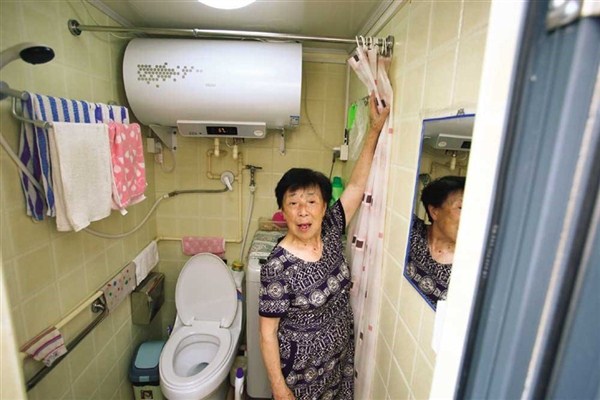
今日上海
静安寺街道全面告别“拎马桶时代” - 2017年09月08日
Farewell to chamber pots, old homes get modern makeover

THE last 144 families living in the Jing’ansi Community are finally saying goodbye to wooden matong and enamel tanyu — Chinese chamber pots — thanks to a district campaign to upgrade living conditions in dilapidated shikumen (stone-gate houses) neighborhoods.
Many residences in the community were created by carving up single buildings into multiple small flats. That meant no room for private toilets.
“I could never be persuaded to use a chamber pot myself,” said Ruth Zimmerman, a former Jewish refugee, in the documentary “Survival in Shanghai.”
She escaped Nazi Germany with her mother from Hamburg in 1939, when she was 9. Every morning, her Chinese neighbors waited in a line on the doorstep for a big wooden cart to come by and collect the chamber pot contents.
“Have you ever heard of the famous old German cologne brand 4711?” Zimmerman said on camera, laughing. “One day, I saw that number on one of the carts.”
For Chinese locals today, there is little to laugh about if their homes are dilapidated, dirty and even unsanitary.
“The chamber pots were so smelly and embarrassing to use,” said Zhao Qiufang, who has lived in a cramped unit on Changshu Road for 34 years.
Her home is common in the Jing’ansi Community, which has many old lanes and buildings. To many people, their “retro” look is a beautiful reminder of the past, but go beyond the façade and the picture of those living in rundown conditions is more grim.
A program to renovate old buildings across Jing’an District began several years ago. Dilapidated structures that could be salvaged have been reinforced. Crumbling pipes have been replaced, and private kitchens and bathrooms installed.
This month, the last chamber pot in the Jing’ansi Community was thrown out after a family had a private toilet built in their apartment.
“We have different solutions to different problems,” said Ye Zhijian, chief of the Party committee working with the community.
“We either put toilets in homes, or create a modern public space for a row of flush toilets, with one assigned to each family, or we install a public bathroom shared by two families close to their homes,” he said.
Zhao lives with her son, daughter-in-law and grandson in a 12-square-meter apartment. Since it was too small to install a bathroom, officials built one on an abandoned plot just in front of her house.
She shares the 2-square-meter bathroom with a neighbor, and the two families paid extra money to get a washing machine and bathing facilities installed alongside the flush toilet.
“It’s liberation!” Zhao declared. “We used to have to dump the excrement from chamber pots at a roadside venue. That was embarrassing, especially since we live in the downtown area of such a modern city.”
By day, she said, she preferred to walk five minutes to the nearest public restroom to use the toilets. But at night, she still had to use a chamber pot.
Improving the lifestyle of residents can change their whole perspective.
“Environment can change a person,” Zhao said. “I used to keep every used bottle I could find so I could sell them. My home became a dump. But after we received our new toilet, I threw all that old stuff away. I want to live in a clean environment.”

